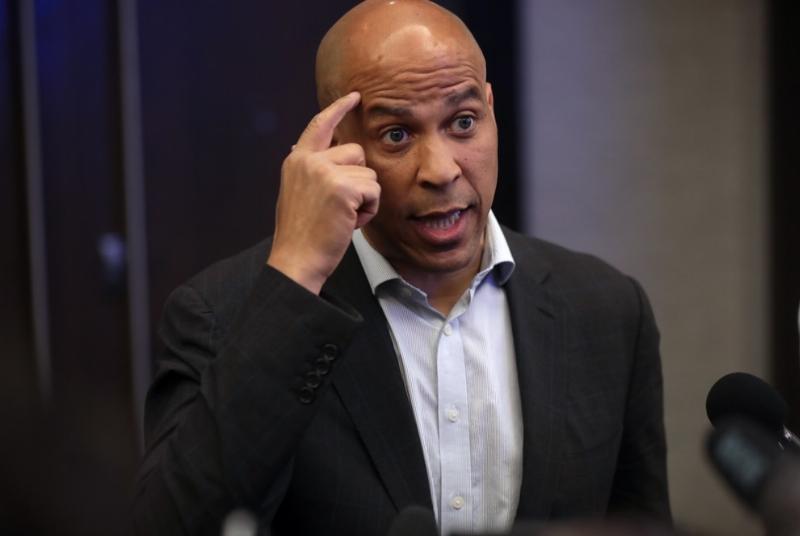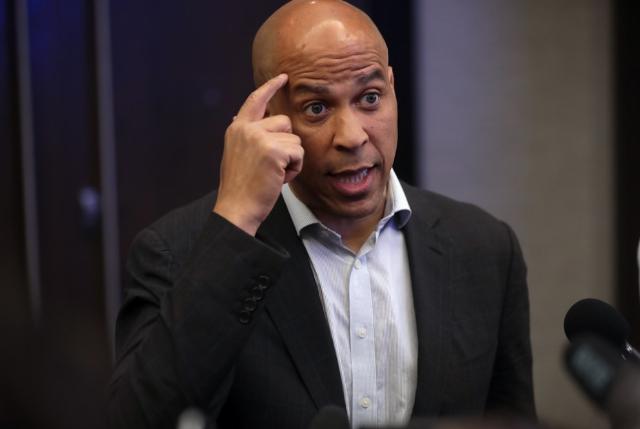


The Bible tells the story of a tax collector beating his chest in an act of sorrow. This is quite different from the reason we have seen Senator Cory Booker (D-NJ) beat his chest during some Senate hearings. The tax collector’s chest beating represented repentance, humility, and shame in the presence of God. Booker, on the other hand, has repeatedly engaged in beating his own chest—not in an exercise of humility but in one of bravissimo and self-righteousness.
In a September 16 Oversight Committee hearing, Booker queried FBI Director Kash Patel. However, he refused to allow Patel the courtesy of responding to his questions, repeatedly interrupting and disrespecting the FBI director by stating his tenure in that office would soon be terminated by President Donald Trump.
Observers had difficulty following the heated discussion between the two before the committee chairman ordered Booker to allow Patel the chance to speak. However, Booker—obviously irate over being so ordered—childishly had to get in one last dig at Patel that could be heard before he finally fell silent, bellicosely exclaiming, “I am not afraid of you.”
This was not the first time Booker looked somewhat foolish with his own chest-beating.
In 2018, as confirmation hearings were underway for Supreme Court of the United States (SCOTUS) nominee Brett Kavanaugh, Booker claimed status as Spartacus—the 2nd century BC slave that a 1960 film turned into a modern day inspirational hero.
Demonstrating a complete lack of humility, Booker declared “I am Spartacus.” Whether his bravissimo was motivated more by his not-yet-released announcement to run in the 2020 presidential election, or, as he claimed, was inspired by his intention to violate Senate rules by releasing classified documents alleging Kavanaugh was racially biased, we do not know. But, literally beating his chest, Booker boasted, although it would put him at risk, he was performing the prohibited act of releasing the documents as one of “civil disobedience.”
Additionally, on July 29, 2025, a shouting match erupted in the U.S. Senate, prompted by an enraged Booker as a bill came before the once-respected legislative body. This time however, his target was not a conservative president’s SCOTUS nominee, but his fellow Democrats.
The bill had come out of a committee hearing with unanimous bipartisan support. While the legislation sought to provide funding for police, Booker sharply criticized his party members for enabling authoritarianism and failing to stand up to Trump by defeating the measure. Demonstrating his anti-Trump bravado, Booker’s criticism triggered an intense debate among his Democrat colleagues, demonstrating a deep party division.
However, sparking such a debate—arguing that party members needed to stand up to Trump—was most revealing about Booker. To him, defeating Trump’s agenda was more important than public safety which, to be met, necessitated replacing the numerous law enforcement officers who had quit due to under-funding and political assaults on their character.
The impact of the defund police movement has taken a heavy toll on many cities as police budgets were foolishly cut. But it did not take long for some of these cities to realize their foolishness. Only after boosting police budgets did cities like Philadelphia, Minneapolis, and Denver recognize a 28%–59% drop in crimes such as homicides.
Ironically, in the 1960 movie mentioned above, after putting down the rebellion, the Romans—not knowing who Spartacus was by appearance—demanded the slaves identify who among them was he. However, in an act of solidarity and defiance, each slave declared, “I am Spartacus.” While that moment was clearly an act of unity, what Booker did by criticizing his colleagues clearly was not.
Socrates was a Greek philosopher credited with the founding of Western philosophy and among the first moral theorists to promote the ethical tradition of thought. He believed a social contract existed between the state and its people by which the latter implicitly agreed to obey its laws for accepting its benefits and the former implicitly agreed to protect them. He definitely would have supported increased police budgets.
But it is clear by his track record, Booker has not only failed to experience “a Socrates moment,” he has failed to experience a Socrates one as well.

Image: Gage Skidmore, CC BY-SA 2.0, via Flickr, unaltered.
